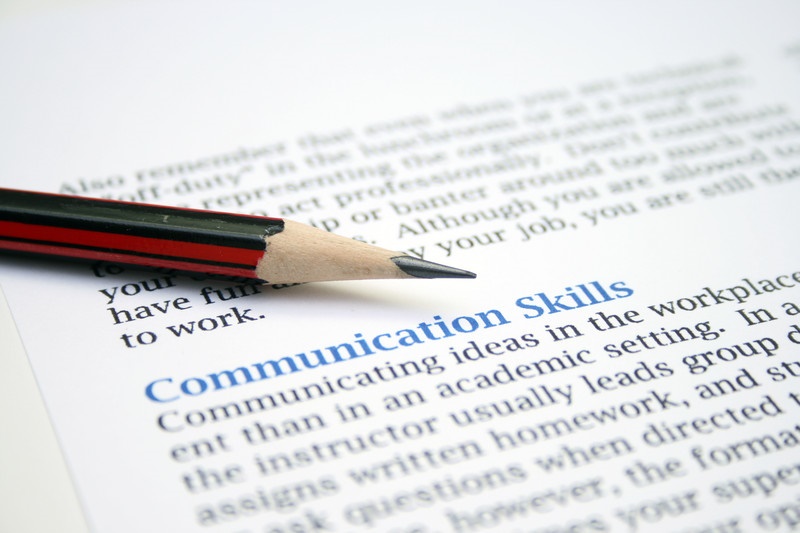
Communication is regularly cited as one of the most—if not the most—crucial factors to strengthening and maintaining healthy relationships. According to the PBS program The Emotional Life:
“How couples behave when solving problems together or arguing can predict the character and success of their relationship. A raised eyebrow, a hand on the arm, or a greeting all may seem like small things, but research shows that the quality of everyday interactions can make or break a relationship.”
Likewise, communication skills are equally important at work: one 2014 survey of about 600 employers found that communication skills are the most in-demand skill set among recruiters. In fact, of five leading skill sets employers consider most valuable when making a hiring decision, communications skills top the list.
From preserving healthy relationships to getting hired to being promoted, communication affects practically every element of our lives. Seeking to improve our communication skills, then, is not a bad place to start if we wish to make some positive improvements.
How to become an effective communicator
Coming to be an effective communicator is not complicated, but it will require some elementary skills and the disposition to practice.
Step one is to recognize that the goal of any communication situation is an honest, open-ended exchange of ideas where all parties can be heard and understood. This calls for assertive and articulate speaking abilities, but, just as significantly, requires strong listening skills.
The reality is, listening skills may be the most important component of communication. The reason is simple: if you are unable to understand what is being said, you won’t have the capacity to articulate a relevant and significant response. This lack of ability to understand is the root cause of countless misunderstandings, quarrels, and bad feelings.
Improving listening skills, then, is the single most important thing you can do to become a superior communicator. And while active listening is often difficult in its own right, hearing loss makes things even harder.
Hearing loss and the obstacles to active listening
Active listening necessitates investing all attention to the speaker. Only by fully comprehending the message can you craft a relevant and substantive response, and that’s why inadequate speakers are nearly always distracted listeners.
But what triggers the distraction?
Here are four typical sources of distraction and how hearing loss has a tendency to make things worse:
Distraction # 1: Stress
If you’ve ever been overly stressed or anxious, you understand how challenging it can be to concentrate. You’re more inclined to be concentrated on your own thoughts and emotions rather than on the speaker’s, and you’re very likely to lose out on essential non-verbal signs and to misread what other people are saying.
Regarding stress, hearing loss by itself is a major source. You may feel anxious about missing important information or coming up with embarrassing responses. And, the battle to hear speech in the presence of hearing loss is a source of stress and strain itself.
Distraction # 2: Lack of focus
Active listening is challenging because our minds have the normal propensity to wander. You can’t both listen to the speaker and daydream, check your email, text, and plan what you’re going to say next. Remaining within the present moment and focusing on the speaker is the only way to pick up on the subtle details of the speaker’s message.
Hearing loss brings about a lack of focus because it takes you out of the present moment. If you’re attempting to determine what the speaker just said, you’re also missing out on what they’re saying at the moment. The continual catch-up virtually guarantees that you’ll never completely understand the message.
Distraction # 3: Misunderstanding
Stress and lack of focus can both cause you to misread the message. This introduces the chance of you becoming upset or irritated with a message that the other person never actually meant to send.
This at the very least wastes time and in the worst case manufactures bad feelings. Not to mention the aggravation of the person who is consistently misunderstood.
Distraction # 4: Lack of confidence
If you lack self-confidence, you’ll find it difficult to assert yourself while interacting. You’ll likely also be preoccupied with what the other person thinks rather than on the content of what they’re saying.
Hearing loss makes things much worse, as you can imagine, because your misinterpretations could be thought of as a sign that you just don’t understand the message. If you’re continuously asking for clarification on simple points, it makes it difficult to feel confident enough to be assertive.
How hearing aids can help you
Coming to be a better communicator requires becoming a better listener, but how can you become a better listener if you have hearing loss? You have a few options, but because hearing aids have advanced so far with respect to recognizing and amplifying speech, they really are the ideal solution.
Contemporary digital hearing aids have a host of extraordinary features made exclusively for speech recognition. Many hearing aid models have background noise suppression, directional microphones, and state-of-the-art digital processing so that speech comes through loud and clear.
Without having to strain to hear speech, you can concentrate all of your efforts on comprehending the message. Then, as you become a more effective active-listener, your self-confidence, assertiveness, and speaking skills will all take care of themselves.
If you have hearing loss and you’re ready to begin building distraction-free listening skills, arrange your hearing test today.
